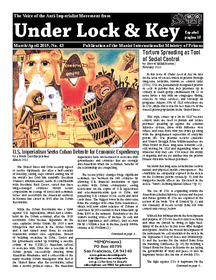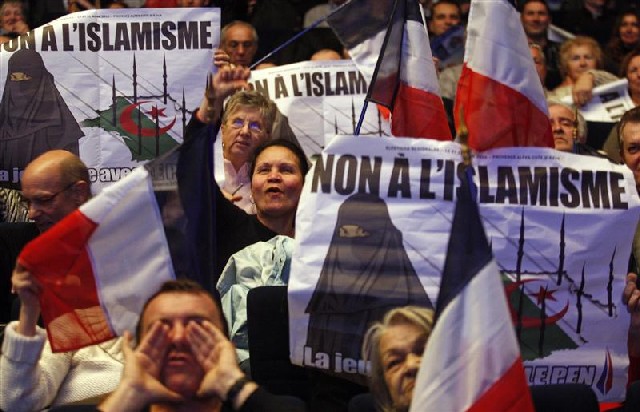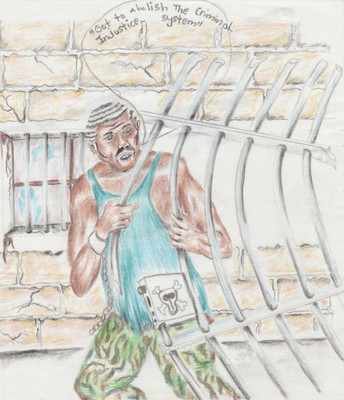
Torture Spreading as Tool of Social Control
In this issue of Under Lock & Key we take on the issue of social control in prisons through long-term isolation, commonly known as control units (CUs). CUs are permanently designated prisons or cells in prisons that lock prisoners up in solitary or small group confinement for 22 or more hours a day with no congregate dining, exercise or other services, and virtually no programs. Almost 50% uf ULK subscribers are in CUs, while this is true for less than 5% of the overall prison population in the United $tates.
This topic comes up a lot in ULK because control units are used to punish and isolate prisoners speaking up against the criminal injustice system, those with influence over others, and even those who just won’t go along with the programmed repression of everyday prison life. Our prisoner activist comrades, United Struggle from Within members are often found in these long-term isolation cells, still writing for ULK and organizing others in whatever way they can. The real purpose of these control units is exposed in “Control Units: Social Control for Semi-Colonies in the United $tates,” and several articles on validation for activism. Control units attack our ability to organize and are yet another way the prisons foment divisions between prisoners.
We know that long-term isolation has serious mental and physical health consequences. The conditions are eloquently exposed in the article on the Delaware Prison System. And the dangerous health effects are discussed in the article “Who’s Defining Mental Illness?”
The use of control units is expanding within the Amerikan criminal injustice system and the past and future growth of control units are explored in the review of the book “Out of Control” and our summary of recent results from our own control unit survey.
With all this information on the development and purpose of control units we need to turn to activism and what we should be doing to fight back. Many of the articles listed above offer insights and options. And for the overall development of the movement we call attention to the article on the September 9 Day of Peace and Solidarity and the lessons for the United Front from the Bandung Conference. By building a United Front for Peace in Prisons we are laying the groundwork of unity and peace to take on important battles like the one to abolish control units.
The fight against prison control units is important for the anti-imperialist movement, but it can only be waged in the context of the broader struggle. We might win some reforms and gain some freedom for our activist comrades behind bars, and better conditions for the general prison population, but until we dismantle the criminal injustice system we won’t be able to effect systematic change. And that will only happen with the overthrow of imperialism because, as is clearly exposed in this issue of Under Lock & Key, prisons are a critical tool of social control for the imperialists. There’s no way the imperialists will give up that control, and they always look for new ways to spin national oppression to sound tolerable and even necessary to the Amerikkkan public.
Control Unit Survey Responses
MIM(Prisons) has been soliciting for data on control units for the past several issues of ULK. We’re forced to do this because there is no central information source on control units in prisons in the United $tates. Even for states that publish data on their population and report on the existence of control units, the counts of prisoners housed there are not always accurate. and there is a trend to downplay and under report on control units. Whether this is by giving them a different name (administrative segregation, super max security, security risk housing, tiers, etc.) or by refusing to talk about these long-term isolation cells altogether, this subterfuge and denial is evidence that the prisons know control units are cruel and unusual punishment.
In response to the frequently heard question of how would we deal with crime differently, first we point out that we do not agree with a definition of crime that allows the biggest murderers and thieves to run the government and military. Once the people have power to control the definition and enforcement of laws to be in the interests of humynity and not profit, we’ll be able to thoroughly deal with the real criminals. We hold up the example of prisons in China during the Cultural Revolution to show how communists handle crime and justice. Prisons in China during that time were places of political education and retraining. Landlords, capitalists, and spies were given an opportunity to understand their crimes against the people, to make self-criticism, and to learn new and useful skills so that they could return as productive members of society. This is in direct contrast to the Amerikan criminal injustice system, which builds recidivism and isolates politically active and influential prisoners in control units without even a pretense of education or rehabilitation.
We received 54 responses to the control unit survey over the past year and this article summarizes some of the new findings.
The respondents broke down by state as follows:
| State | Respondents |
|---|---|
| AR, DE, FL, KS, MD, ME, MO, NV, OR, SC, UT | 1 |
| AZ, CT, IL, PA, TN, WI | 2 |
| IN | 4 |
| CA | 6 |
| TX | 8 |
| GA | 13 |
The high response rate from Georgia, Texas and California is at least in part reflective of the activism going on in those states, as well as the control unit prisons and cell blocks that have proliferated in those states. In many cases we received data on the same prison from multiple sources.
While close to half of the survey respondents did not report on the year the control unit opened (presumably because they didn’t know), 12 of the units reported on opened in the past 2 years. That’s a lot of new prison control units. This includes prisons in Georgia, Pennsylvania, Illinois, Maine and California.
Some prisons are control units in their entirety. Modeled after the first long-term isolation prisons in Marion and Lexington, these facilities are entirely dedicated to long-term solitary confinement. But most control units these days are separate sections within an existing prison. This might be a whole yard, several units, or just specific cells. This makes it more challenging to count the number of control unit beds/prisoners accurately, and gives the prisons a way to hide their torture programs within regular prisons.
The reasons given for locking prisoners up in long-term isolation vary, but most come back to some sort of justification based on safety and security, citing a history of violence or fighting, or rule violations. In many prisons there is a policy of locking up “Security Threat Group” members, also known as “gang members,” for which validation is arbitrary and punitive, as we discussed extensively in Under Lock & Key 41. As one prisoner explained: “If you are politically conscious and write about such they claim ‘gang activity’.” Several others described the arbitrary nature of control unit assignment, explaining what gets people into these units in their prisons: “COs will falsify the lock up order and sergeant and lieutenant will go along”, “Any and everything. Such as litigator-grievance filer”, and “No information in inmate handbook. As far as known, administrative discretion.”
Most people were unaware of new control unit prisons being opened or planned for in their state, but 13 people reported on known plans for new control units. This underscores the importance of our work to shut down these torture chambers.
Many survey respondants reported on the conditions in these control
units. Below are some of the representative descriptions:
“Subpar treatment of prisoners, small food portions, withholding of property, mail, etc.”“They are all sensory deprivation torture at its best”
“We don’t get yard correctly or food in proper proportions”
“Barbaric, human degradation less than dogs receive at the pound”
“We are locked in for 24 hours a day. Shower, sometimes every other day for 30 minutes. We get outside recreation for 5 hours once every 7-10 days”
“Each cell here only gets 30 minutes a day of dayroom and 3 hours of yard a week”
“They lie on us, beat us up, starve us, they don’t give proper medical attention”
“While in segregation for almost four years, myself and other prisoners were subjected to the most inhumane and barbarous treatment. There were periods in which we went months without getting showers. In my almost 4 years here, I had recreation/exercise maybe 20 times. Prisoners would be stripped out, completely naked in their cells for days. Prisoners would be gassed/maced with multiple cans of this toxic agent – guys were sprayed so regular and with such large quantities of gas, they many of them had built up physical and psychological resistances to the torture – guys would brag about being able to ‘eat’ the gas, and the officers were so use to using such large quantities of gas, if they gassed someone with only one can and the person coughed and choked, they’d say things like ‘you lil’ bitch, you can’t even take a full can.’ Prisoners would be denied food, prisoners were beaten with restraints on, prisoners were shot with the canisters of tear gas guns, while locked inside of their cell, and on May 7th or 8th of 2012, one mentally ill prisoner was allowed to hang himself, while the officers simply slept the night away. There are so many crimes that have been committed behind these walls by animals that have the audacity to call us (the least of these) criminal.”





 Download printable PDF
Download printable PDF




